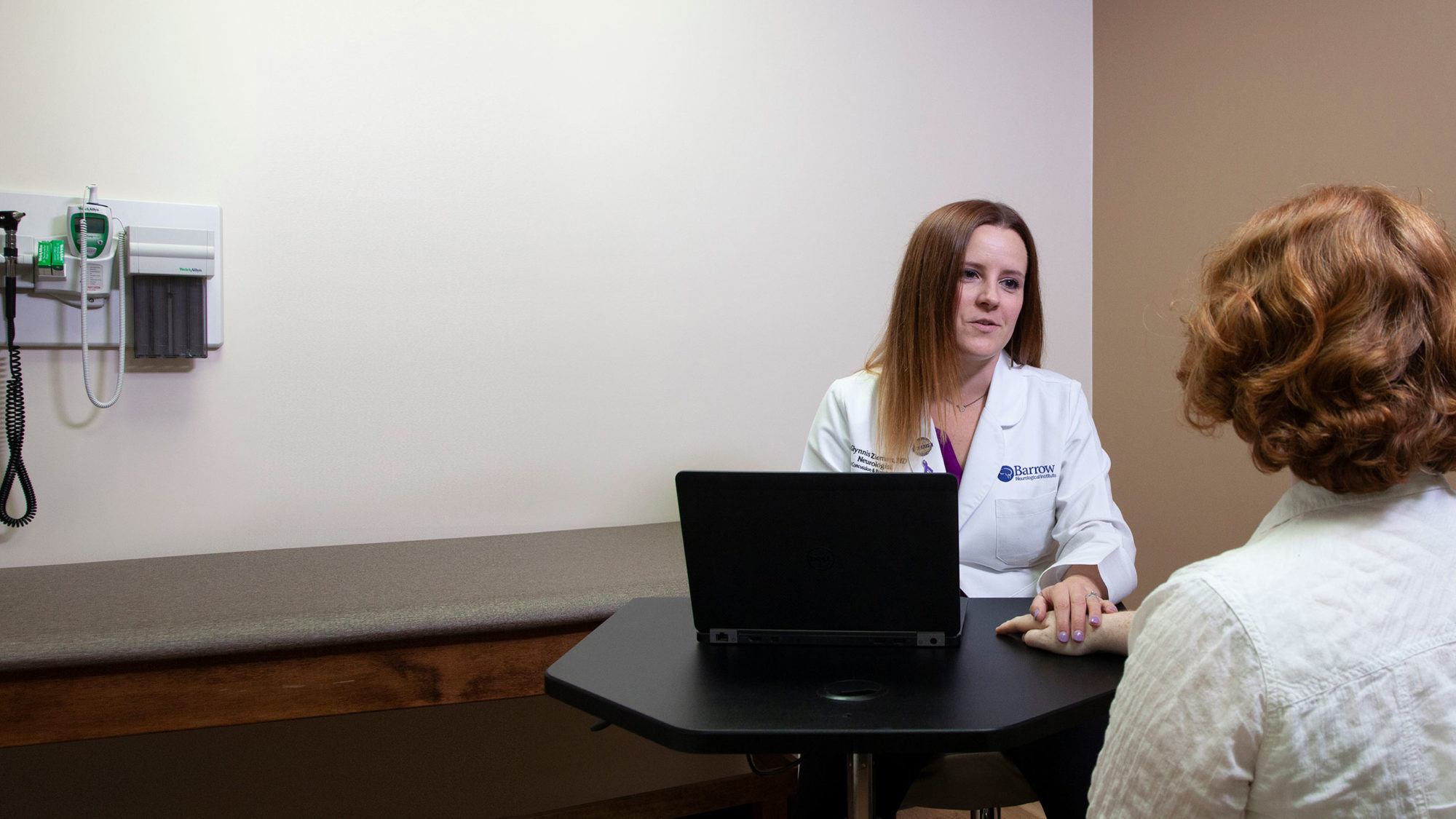
Persistent Post-Concussion Symptoms
At a Glance
- Persistent post-concussion symptoms, also known as post-concussion syndrome, occur when symptoms last weeks or months beyond the initial injury.
- Common symptoms include headaches, dizziness, difficulty concentrating, memory issues, sleep disturbances, mood changes, and sensitivity to light or noise.
- Diagnosis is based on neurological evaluation and symptom history, often supported by cognitive or balance testing.
- Treatment focuses on personalized rehabilitation, which may include physical therapy, vestibular therapy, cognitive strategies, and transitional neuro-rehabilitation.
Overview
Formerly known as post-concussion syndrome (PCS), persistent post-concussion symptoms are symptoms that last weeks or months following a concussion, well past the standard recovery time. The typical recovery time after a concussion is two to four weeks in adults; for children or teens, it’s four weeks. Doctors characterize symptoms that persist beyond either of those ranges as persistent post-concussion symptoms.
With persistent post-concussion symptoms, the brain doesn’t bounce back as expected. Most people with a concussion heal within a couple of weeks, but others can experience symptoms that can linger for weeks, months, or even longer. These symptoms can include headache, dizziness, fatigue, irritability, difficulty concentrating, and difficulty performing mental tasks.
What causes persistent post-concussion symptoms?
Persistent post-concussion symptoms happen when the brain doesn’t fully recover after a concussion. However, the exact cause of this is unknown. Doctors think these symptoms persist for a variety of factors, including:
- The brain’s “wiring” is still healing: The brain is a complex network of circuits and connections, and a concussion temporarily disrupts this network, especially in the areas that control memory, focus, balance, or emotion. Healing connections and communication pathways can take longer to repair in some people.
- The nervous system gets dysregulated: A concussion can throw off your autonomic nervous system, which controls your heart rate, blood pressure, and stress response. You might feel dizzy, anxious, overwhelmed, or have trouble sleeping because your brain and body remain in “fight-or-flight” or stressed mode.
- Inflammation may linger: After a concussion, the brain may have lingering inflammation, a temporary imbalance in neurotransmitters like serotonin or dopamine, and a disruption in blood flow to particular areas. While these changes don’t appear on standard imaging tests, they can still lead to foggy thinking, fatigue, or mood changes.
- Pre-existing conditions can make recovery harder: Individuals with a history of migraines, anxiety, or depression before a concussion are more sensitive to the effects of a concussion and prone to a slower recovery. So, too, are those who have had past concussions, are in the thick of stressful life events, or have poor sleep habits.
- Other systems might be involved: Sometimes the neck, inner ear, or vision system is affected but not appropriately treated. If these issues aren’t identified and treated, symptoms can continue even after the brain heals.

Persistent Post-Concussion Symptoms
There are four categories of persistent post-concussion symptoms, including physical, cognitive, behavioral, and sleep symptoms. You probably won’t experience all of these symptoms, but you’ll likely experience more than one type.
If you or someone you know is experiencing persistent post-concussion symptoms, you might experience a combination of the following:
Physical symptoms can include:
- Headaches: Because the brain’s pain processing and blood flow regulation are malfunctioning, persistent posttraumatic headaches are common and variable. They can have different features, including those of migraine, tension headache, or headaches arising from pain and tightness in the neck.
- Fatigue: Following a concussion, your brain works harder than usual to perform simple everyday tasks, so you’re prone to feeling fatigued sooner.
- Dizziness or balance issues: If your concussion affects your vestibular or visual system, which helps with balance and eye tracking, you may feel lightheaded or like the room is spinning.
- Sensitivity to light or noise: Bright lights or busy environments can feel overwhelming because your brain’s filtering system isn’t working as intended. As a result, it’s common to feel overloaded by stimuli that typically wouldn’t bother you.
- Visual issues: Blurry vision, double vision, eye strain, or trouble focusing on screens or reading happen due to a disrupted ocular motor system, which controls eye movements.
Cognitive symptoms can include:
- Difficulty thinking and concentrating: Losing track of thoughts and feeling as though you’re processing things more slowly can be common, due to your body’s response to the concussion and the disruption of your brain’s communication pathways.
- Difficulty with memory: Forgetfulness and trouble learning are common due to disrupted neural communication in the brain.
Behavioral symptoms can include:
- Irritability: Irritability is often experienced with a concussion because the neural pathways that regulate emotions have been disrupted—not to mention, these same symptoms can be frustrating and irritating.
- Anxiety or depression: A brain injury affects neurotransmitters and the mood-regulating areas of the brain, even if you didn’t feel down, anxious, or panicky beforehand.
- Feeling more emotional or an onset of apathy: Because the mood-regulating areas of your brain have been affected, you may experience an onset of bigger emotions. Conversely, indifference or detachment can also occur.
Sleep symptoms can include:
- Sleeping more or less than usual: Your brain injury may affect your hypothalamus or the brainstem, which regulates your sleep-wake cycle. Sleeping more than usual is most common with a recent concussion.
- Trouble falling asleep or more frequent sleep disturbances: You may experience this after more time has passed due to the ongoing disruption of your brain’s sleep-wake cycle.
If you’re experiencing one or more of these symptoms after a concussion, you need to be evaluated by a healthcare professional as soon as possible. Early detection and treatment can help prevent further complications and improve persistent post-concussion symptoms.
Persistent Post-Concussion Symptoms Diagnosis
At this time, no blood test or brain scan can definitively tell whether or not you have a concussion with persistent post-concussion symptoms. Instead, physicians base the diagnosis on the inciting event, how long your symptoms have lasted, how they affect you, and by ruling out other causes.
Your doctor might use the following comprehensive exams and testing to diagnose persistent pose-concussion symptoms:
- Symptom history: While there’s no official checklist for persistent post-concussion syndrome, your report of ongoing symptoms will be the most important diagnostic tool. Your healthcare provider will ask about when the concussion happened, how it happened, the specific symptoms you’re experiencing, how long your symptoms have lasted, and whether your symptoms affect your work, school, and sleep.
- Neurological exam: Next, your provider will check your balance, reflexes, coordination, eye movements, and cognitive functions like memory, processing speed, and attention. This helps them rule out more serious brain injuries or other potential causes.
- Cognitive testing: You may be asked to perform neurocognitive tests to assess how well your brain processes information. These simple tests can show subtle impairments, even if imaging is routine. They can include paper-based or computerized tests that measure your verbal and visual memory, attention span, language, visuospatial skills, and executive functioning.
- Imaging: Neither magnetic resonance imaging nor computed tomography scans are used to diagnose persistent post-concussion symptoms, but they can rule out other things, such as skull fractures or bleeding, to make sure nothing else is overlooked.
The Brain Injury & Sports Neurology Center at Barrow Neurological Institute
The Brain Injury & Sports Neurology Center at Barrow Neurological Institute offers cutting-edge treatment for adults and adolescents with concussions, TBI, and neurological conditions in athletes in one inclusive location. While our highly trained specialists excel in treating all manner of post-concussion symptoms, we’re also forging a new path forward in how the U.S. addresses concussions in youth and high school sports. We’ve even developed a program to help survivors of domestic violence who have suffered concussions or TBIs as a result of abuse.

Persistent Post-Concussion Symptoms Treatment
Treating persistent post-concussion symptoms depends on the symptoms you’re experiencing, as well as which parts or systems in your brain continue to be affected. Oftentimes, multidisciplinary care from neurologists, physical therapists, occupational therapists, speech-cognitive therapists, psychologists, psychiatrists, and neuropsychologists is necessary because multiple systems are impaired.
While every brain injury is different, treatments for persistent post-concussion symptoms typically include a combination of:
- Cognitive rest and pacing—e.g., a fair amount of bed rest, but not total bed rest
- Physical therapy, especially for balance or neck issues
- Vision therapy
- Vestibular therapy for dizziness
- Medications for sleep or mood symptoms, if needed
- Psychological support for coping with the after-effects
More specifically, doctors may enlist the following treatments for persistent post-concussion symptoms:
- Headaches and migraines: The medications used for headaches tend to be similar to those used for migraines or tension headaches. Your doctor might prescribe you medications for both the rescue and prevention of headaches. If neck tension is a contributing factor, physical therapy can help.
- Dizziness and balance problems: Vestibular therapy can retrain your inner ear and brain to handle motion and balance better, while eye-tracking and coordination exercises can help if visual motion triggers your dizziness.
- Visual disturbances: Eye exercises known as neuro-optometric therapy retrain how your eyes move, focus, and coordinate. Prism glasses or tinted lenses can reduce eye strain or correct visual misalignment. At the same time, screen-time strategies like blue light filters, bigger fonts, and shorter screen intervals are supportive.
- Cognitive fog and memory issues: You can work with a speech-language pathologist or neuropsychologist to improve memory, attention, and organization. Occupational therapy can also help with daily tasks, time management, and adapting your environment.
- Fatigue: This is mitigated by slowly building your stamina without overloading your brain, prioritizing certain tasks, and scheduling frequent breaks.
- Sleep problems: Good sleep hygiene, such as a consistent sleep schedule and no screens an hour before bed, is key. Your doctor might recommend melatonin to reset your sleep cycle.
- Anxiety, depression, mood swings: SSRIs or other antidepressants may be used if mood symptoms are interfering with recovery, while cognitive behavioral therapy (CBT) can help manage emotional symptoms, fear of re-injury, and any adjustment issues. Mindfulness, breathing exercises, and yoga can also help regulate the nervous system.
- Light or sound sensitivity: Gradual exposure, or reintroducing light or sound in small, controlled ways, can help. Temporary aids like tinted lenses or earplugs can also provide support while you work to become desensitized to lights or sounds.
As you recover from persistent post-concussion symptoms, you’ll follow return-to-activity protocols that guide you safely back into physical or mental tasks. Accommodations like modified workloads, extra breaks, quiet environments, or reduced screen time are also helpful.
Common Questions
Who gets persistent post-concussion symptoms?
Anywhere between 10 and 20 percent of people who experience a concussion go on to develop persistent post-concussion symptoms, or symptoms that last longer than the expected recovery time following a concussion.
Of those with persistent post-concussion symptoms, most recover within three months. However, five to 10 percent of those with lingering concussion symptoms may experience symptoms that persist for six months or longer.
Who gets persistent post-concussion symptoms?
Anyone who has had a concussion can experience persistent post-concussion symptoms. However, individuals with a history of any of the following may be more prone to experiencing them:
- A history of migraines
- A history of mental health conditions, such as depression, anxiety, or PTSD
- A previous concussion or prolonged recovery after an earlier concussion
- Being under high stress at the time of injury
- Severe symptoms after injury
Females, teens, and young adults are also more likely to get persistent post-concussion symptoms. This thought to occur because women tend to report persistent symptoms more often than men, hormonal differences and differences in biomechanics and neck strength. And as a teen or young adult, your brain is still developing, which makes it more sensitive to a concussion.
What is the prognosis for someone with persistent post-concussion symptoms?
The prognosis for someone with persistent post-concussion symptoms is generally favorable, especially with the proper treatment and support. Most people recover fully, but slowly—even if symptoms linger for weeks or months. The majority of persistent post-concussion symptoms go away within a year of the injury.
Generally, your prognosis is better if you get the proper rest early on in a “paced recovery”—you’re not assuming total bed rest, nor are you returning to work, school or sports too soon or pushing yourself too hard after you return—you don’t have a history of multiple concussions or mental health conditions, you seek out the care of specialists like neurologists, physical therapists, or neuropsychologists, and perhaps most importantly, you’re patient with your healing.
Can persistent post-concussion symptoms be prevented?
While you can’t completely prevent persistent post-concussion symptoms, you can reduce the risk of symptoms developing or lingering for too long. The key is knowing what to do and what to avoid immediately after a concussion and in the following weeks.
- Recognize the concussion early: The sooner a concussion is identified, the better. Continuing to play sports, work, or stay highly active right after a head injury increases the risk of symptoms becoming worse or lasting longer.
- Avoid total bed rest, but don’t rush back too fast: Complete rest in a dark room for days isn’t helpful and can worsen things. At the same time, doing too much too soon—especially physically or mentally—can delay healing. Pace yourself and listen to the cues from your body and your brain.
- Limit screen time and overstimulation early on: Bright screens, video games, scrolling, loud music, and multitasking can aggravate brain symptoms in the first few days. This can stress the system and increase the risk of persistent symptoms.
- Sleep well and manage stress: Sleep is when your brain undergoes the most healing. Poor sleep after a concussion is a significant risk factor for prolonged symptoms like brain fog and mood swings. Additionally, stress, anxiety, and pre-existing mental health conditions can make concussion symptoms feel worse or last longer.
- Address specific symptoms promptly: If headaches, dizziness, vision problems, or anxiety linger beyond two weeks, getting treatment sooner can prevent them from becoming chronic.
- Protect against repeat injuries: Getting another concussion before the first one heals dramatically raises the risk of long-term symptoms.
If a concussion is recognized early and you manage your recovery wisely, the risk of long-lasting, persistent post-concussion symptoms drops significantly.



